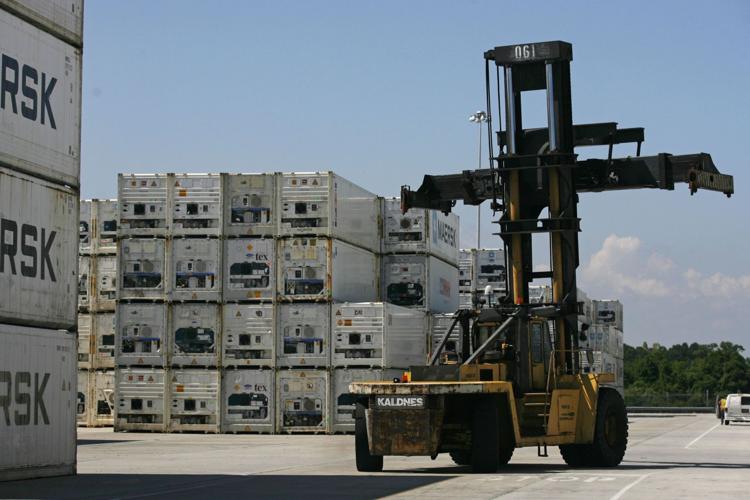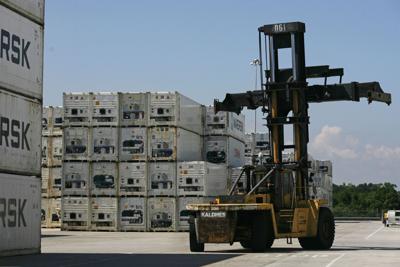The mammoth Walmart import center in Dorchester County is poised to feel a chill in the air when a new neighbor moves in down the block.
It’s by design.
A supply-chain business that operates Arctic-like way stations for meats and other frozen consumables is moving ahead on a previously disclosed plan to build a climate-controlled warehouse in the Ridgeville Industrial Campus.

A cold-storage warehouse on Remount Road in North Charleston was the only game in town in 2009.
The project is being driven by the Port of Charleston “and the region’s prominence as a leader in agriculture and food processing,” according to an April 11 statement from Arcadia Cold Storage & Logistics.
The company’s 262,000-square-foot structure will be “fully racked” with more than 34,000 pallet slots “for customers seeking a capable cold-storage partner in the region with specialized port-related services,” said J.D. Schwefler, chief commercial officer.
“They started clearing land this month,” he said Thursday.
Schwefler projected Arcadia’s first Lowcountry site will be ready to take in shipments of beef, poultry and other quick-turn supermarket perishables in the third quarter next year.
“It’s a wide variety of things that come through the Port of Charleston,” he said.
As it has in the past, the company is working on the Ridgeville deal with Saxum Real Estate, a New Jersey-based developer that owns the dirt and has built about 2 million square feet of cold-storage warehouse space around the U.S.
“The message from our customers is clear — they need a better solution in Charleston and we are happy to fill that role,” Schwefler said.
It’s no small coincidence that Saxum acquired its 31-acre parcel from the S.C. State Ports Authority. The land is part of a roughly 1,000-acre former timber tract near S.C. Highway 27 and U.S. Highway 78 that the maritime agency purchased for $16.2 million in 2018 to attract and house businesses that move cargo through the waterfront some 28 miles away.
Walmart’s $220 million retail import hub was the first big fish the SPA landed.
The Arcadia-Saxum deal followed. It first burrowed to surface under the code name “Project Aardvark” in late 2021, when port officials asked lawmakers to approve the $3.3 million land sale.

The State Port Authority’s Ridgeville Industrial Campus in Dorchester County is already home to a huge Walmart import center. A frozen-foods warehouse is set to open in 2025.
More details were released in October 2022, after the S.C. Commerce Department approved incentives for the $70 million investment that was expected to create 69 jobs at the time.
The deal then went mostly quiet, with the exception of the April 2023 real estate closing — until last week.
The Arcadia expansion stemmed in part from a gaping real estate deficit that the SPA spotted nearly 15 years ago. Back then, the region’s entire refrigerated storage inventory totaled a meager 50,000 square feet.
And every bit of it was full.
The availability has is now tipping closer to 1 million square feet, not counting the Arcadia development and a smaller chilled warehouse that locally based FlexCold plans to complete next year in North Charleston.
“Freezer capacity has grown dramatically as well with several new and expanded freezer operations” the SPA said on its website.
The need for cold-storage space reflects the port’s 110 percent jump since 2011 in the volume of loaded refrigerated containers that come through its terminals.
The surge has been attributed in part to the Southeast’s population explosion and changing dietary habits in the U.S. and overseas. Another key factor was the state’s decision to increase highway weight limits, allowing truckers in South Carolina to haul heavier loads, namely frozen food products.
In a year-end report, Charleston-based Bridge Commercial said the cold-storage real estate market “continued to show growth” in 2023. Looking ahead, it singled out one reason the industry is primed to gain more heft, straight from the supermarket aisle.
“U.S. cattle prices are at record highs with current domestic herd production at a 60-year low,” the firm said. “This will push the need for import facilities for red meat.”
Brooks Courtney, an associate vice president with Bridge Commercial, said the produce section is another potential growth market. He noted that fruit and vegetable imports, such as clementines from South Africa, could require packaging and fumigating services once they come ashore. Also, they must be stored at higher temperatures than meats require.
“Right now all of the existing facilities in Charleston operate as freezers,” Courtney said Friday.












